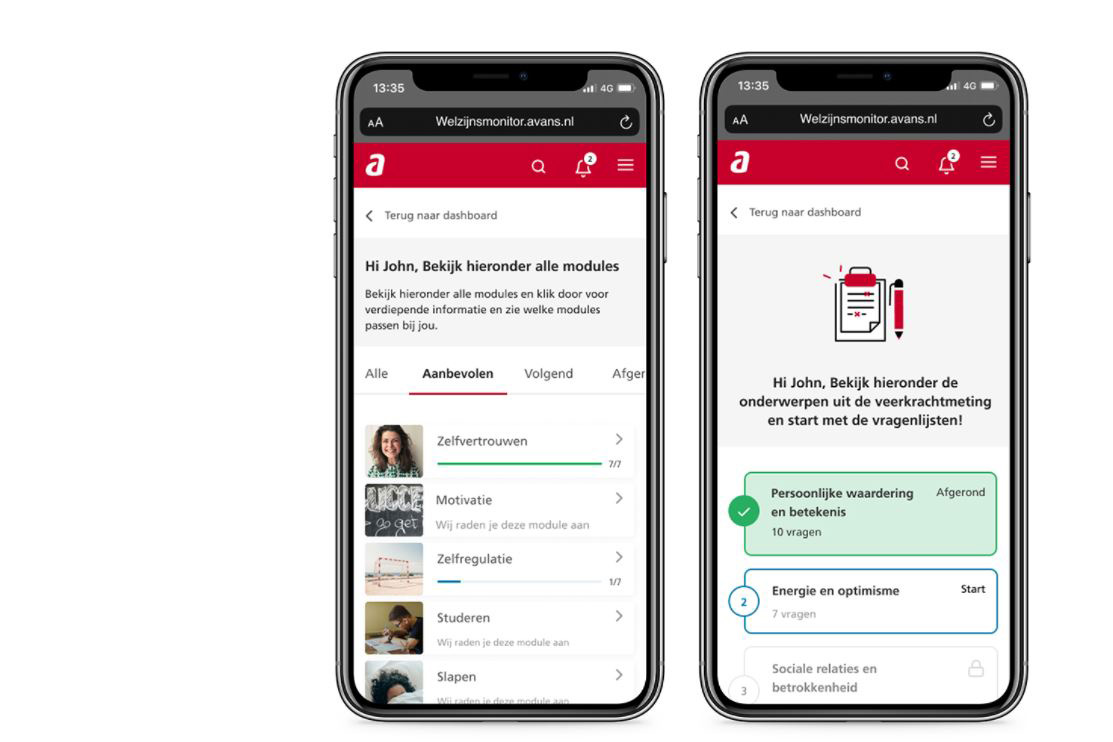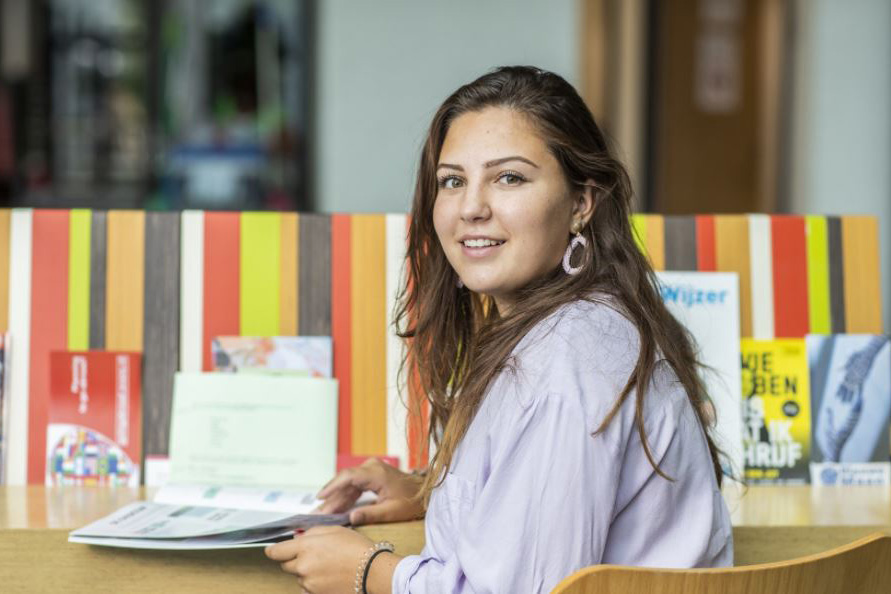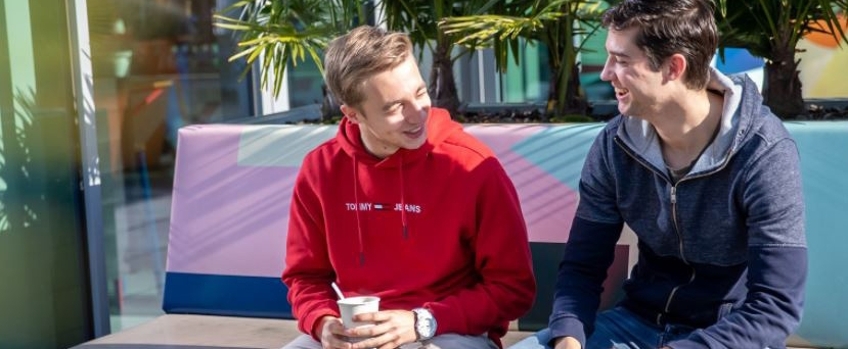Student wellbeing is a major priority of Avans University of Applied Sciences Ambition 2025 strategic plan. Various resources are being developed to meet this goal, such as the Wellbeing Monitor app, the SWITCH training course for those who are unsure about their choice of study programme, and peer coaching for and by students. Add to that the Avans Extra activities and a new role for study development counsellors and it’s safe to say we are well underway towards enhancing student wellbeing.
1. Wellbeing Monitor
This app is designed to provide feedback to students. The tool assists those searching for answers to questions about feelings and self-development opportunities, training courses, coaching, and who to go to for help with these things. The app will also give us input that we as an institution can use to improve student experience for the future. This includes such things as increasing student programme completion; assisting students in making choices, differentiating between programmes, and developing personal potential; and improving Avans’ self-development course offerings.
Jessica Nooij, policy researcher and data analyst at Avans, is leading the development of the Wellbeing Monitor app. “Often students have the feeling that they have to be perfect in everything they do, primarily because of the influence of social media but also because of the many choices they have to make as the curriculum becomes more flexible. That’s why it’s important for us to enhance our focus on student wellbeing within the institution.”
Mood tracker
But how can an app help improve students’ wellbeing? Jessica: “By monitoring student wellbeing; by asking, how happy are you with yourself? Are there questions or problems that are making things more difficult? Soon you will also be able to use a mood tracker to indicate how you feel, how stressed you feel. The app will be able to immediately offer you a good remedy. From a meditation exercise you can do right away to a referral for an appointment with a student counsellor or study development counsellor.’’

2. SWITCH training course for doubters
Student success depends on feeling good about yourself. That’s why it’s important to have the feeling you made the right choice of study programme. If you are doubtful, the SWITCH training course can help you make up your mind. Project leader Eva-Lisa Jansen explains how this works.
You are not alone
But how does it work specifically? Eva-Lisa: “The course consists of three parts: where do I come from, where do I stand now, and where am I going. You work in small groups with students from different programmes. This already gives you the feeling that you are not alone in this. You meet once every week for six weeks and have homework. After you complete SWITCH, you may decide to stay at Avans, but we also discuss other options. If you would be better off somewhere else, then that is a definite possibility. But you can also transfer within Avans, for example to an Associate Degree.’’
Eva-Lisa herself started at the Avans school for Social Studies, but it turned out not to be what she wanted. “I switched to Breda University of Applied Sciences, but I didn’t feel that was right for me either. So I went back to Avans and this time to study Communication, which I successfully completed. But if there had been a SWITCH training course at that time, then it might have saved me one of those transfers.”

3. Learn to stop worrying with peer coaching
If you are feeling stressed, it might help to talk to one of your fellow students about it. There’s a good chance they might recognise the situation you are experiencing. That’s why we set up the peer coaching programme. Third and fourth-year students receive training to act as coaches for first-years, international students and students with a specific learning difficulty if they are not feeling good about how things are going.
Marieke Boonen is a study development counsellor and lecturer/trainer in professional skills at Avans. She is leading the project to put peer coaching on the map. It’s good for students’ personal development to become peer coaches, Marieke says. “They get really energised if they can help out their fellow students. They are properly supervised and get feedback in peer coaching meetings. After their training session they receive a certificate; they also receive a fee for these services.”
Finding a buddy
It’s a good idea for students from the target groups to contact a peer coach. “Then you can talk to a buddy who shares your worries or problems. It may feel as if a student counsellor or study development counsellor is more distant from your situation. Or maybe you would just like the opportunity to talk to a fellow student.”

4. Avans Extra for dates, lifestyle and more
To put it briefly, Avans Extra has been organising extra curricular activities for three years. There are now eight staff members who work on the extra curricular offerings and the number of interested students keeps rising. Still, they want to keep growing.
The Avans Extra programme coordinator and programme manager Renate van Dierendonkc-Zweers explains: “We particularly want to draw more students’ attention to our offerings. Currently we’re in consultations with Ontwikkelen@avans about being included in the curriculum development platform Avans StudyPath.”
Matching students
Along with workshops about living and working as a student, Avans Extra matches students via Avans Dates so they can get to know someone else. For the time being still online, and no, it doesn’t have to be romantic. The students at Green Office set this up. There is a gratitude programme – “Are you ever lucky” – and they organise a Digital Detox.

5. The changing role of study development counsellors
It is becoming clearer that student wellbeing entails more than just passing your courses. Lecturers who act as study development counsellors are seeing their role changing. “New skills and methods are necessary for sharing information and knowledge,” says Dorien Meeuwis, who is leading the professionalisation project.
New questions
Students need more or a different kind of counselling because of the new teaching model that offers more flexibility and selection. New questions arise about student potential and wellbeing, and the Wellbeing Monitor mentioned above is a great resource for answering some of these questions. Both the student and the guidance counsellor have access to the app.
This creates an environment where everyone has a chance to develop their potential and make use of their talents.
